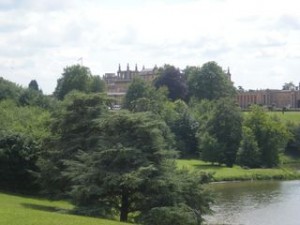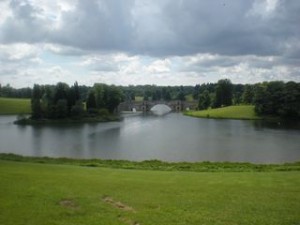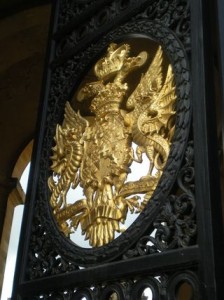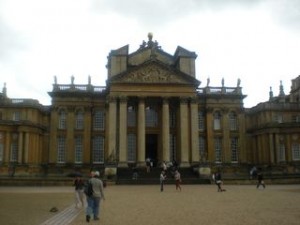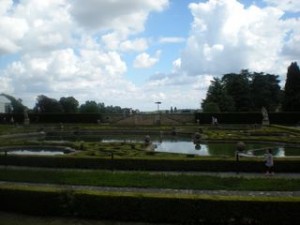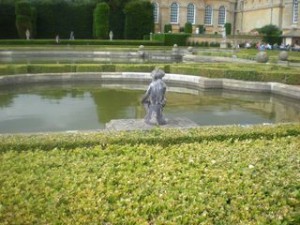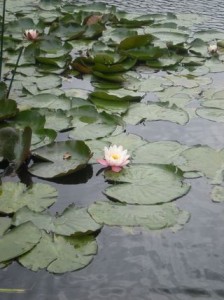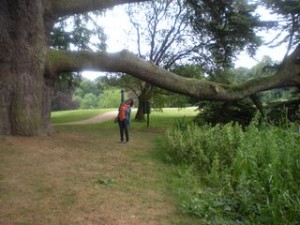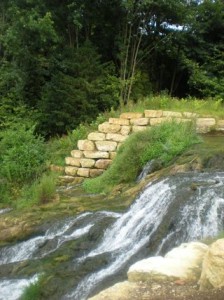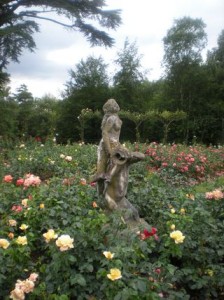Blenheim Palace grandly emerges from a cluster of verdant trees. Its amber walls appear to glisten in the English sunlight. Helen has recommended that we enter the back gate of the palace for just this view. It is stunning. To the right of the palace is a great stone bridge crossing a serene lake with ducks and swans lazily paddling past. We make our way across lush, yet closely cropped grass to the main entrance just beyond rows of tour buses which mar the reverie that one could be approaching the palace on important business. It’s still pretty grand though.
Blenheim Palace is the home of the current Duke of Marlborough, the 11th of a long line dukes carrying the same title, and was most notably the birthplace of Winston Churchill. In 1705, the first Duke of Marlborough, Sir John Churchill, a distant cousin of Winston, was given the property and funds to build a palace by Queen Anne after winning a crucial battle at Blenheim. A copy of the note that he wrote to the queen announcing his victory is on display in one of the many ornate state rooms. It was written on the back of a pub bill. The tapestries in that same state room tell the story of the victorious battle. A 110-pound silver centerpiece in the Salon shows the duke riding on his horse on the way to share his news with the queen. An American, and a Vanderbilt to boot, was a Duchess of Marborough in the 1940s. Her portrait appears throughout the house and in one of the state rooms is a carved golden bassinet, a replica of one that her mother saw in an Italian museum and insisted that her grandson sleep in something similar. Just down the hallway is the room where Churchill was born and exhibit featuring his letters, writings, family portraits and his water paintings. Did you know that his art has been featured on Hallmark Cards? Me, neither. I love learning random facts like that, which made this an enjoyable tour. The tour guide looked like he could have been one of the previous dukes, old and stately. One of the most impressive rooms inside the home was the library, said to be the second longest library in a private home in the UK. Not a bad statistic when you can also boast that you have the largest organ in a private home in that same library. It’s a large grey pipe organ sitting at the opposite end of the library from a marble statue of Queen Anne. Also, in the room are photos of past presidents and dignitaries who have visited Blenheim like Ronald Reagan and Bill Clinton, along with clear signs that a duke lives there such as an invitation to the wedding of Charles and Diana.
And, as impressive as the inside of the palace is, the outside is even more so with gorgeous grounds and gardens. Helen and I decide to take a walk, a common British past-time, and plenty of others have the same idea. Apparently, locals like to spend their weekends at the palace, packing a picnic or just strolling its paths. We start at the Water Terraces at the back of the palace where little cherubs balance on the edge of still pools lined with precisely cut bushes. It’s the perfect day for a walk and we need to walk off the bacon sandwiches and cream tea that we had for lunch earlier. It is cool with a slight breeze and moments of brilliant sunshine. We walk along the lake and spot an interesting tree with a sturdy low hanging branch and wonder how it grew without snapping. We stop to take photos of dainty waterlilies a few steps away, then walk on to pass a water cascade and into a beautiful rose garden with at least 10 varieties of roses ranging in color from coral to red and yellow to white.
elen and I could have spent even more time exploring the grounds, but we had to make our way back to Oxford to meet one of Helen’s friends for dinner. On the 25-minute bus ride from Woodstock back to Oxford we sat in the front row at the top of the double-decker bus for a fun view of a poppy field and a plane flying into the Oxford airport. Our first stop in Oxford was the Turf Tavern, apparently the place to stop for a beer in Oxford. We enter through a narrow cobblestone alley way and find ourselves in a crowed courtyard of rosy-faced students, older academics and familes with kids. We can’t find a seat outside, so we duck inside the stone-walled pub with low ceilings and mismatched wood furniture and banquettes. We finally find a spot to sit and save a spot for Helen’s friend Duncan, a writer for Newsweek, covering China. Helen sends me off to get some beers and while at the bar, I remember that she said that I had to have a Pimms, so I order one and get a cider for Helen. The Pimms is my new favorite drink. I failed to take a picture of one because I liked it so much. Basically, it is gin-based liquor, reddish in color, mixed with ginger ale and garnished with fruits and some vegetables. Mine had oranges, apples and cucumbers. It was so refreshing and delicious.
Duncan arrived with a ginger beer and snacked on potato chips, or crisps as they are called here, a common thing to do while having a beer in a pub. We started talking immediately about the journalism news of the week–the shutdown of the News of the World, Britain’s largest tabloid paper owned by Rupert Murdoch. NoW, as it is called, was at the center of a wiretapping scandal, alledgely tapping phones of celebrities, soldiers and missing children, in order to get private details and the first scoop on big stories. The scandal even touched the prime minister’s spokesperson, a former editor. Duncan and other British journalists suspect that Murdoch shotdown the paper to take any heat off his son in top management at the paper. We went on to talk about Weiner-gate and other topics surrounding the sad state of journalism before we all made our way to a quaint Bengali restaurant. We dined on mildly spiced chicken and lamb dishes as the conversation turned to China’s desperate desire to become more modern at the expense of its amazing ancient cultural architecture with skyscrapers and malls replacing gardens and old homes.We also laugh at ridiculously translated signs that we encountered while visiting China. Duncan recalls a sign on a drink vending machine recently, which was loosely translated into English: Don’t share cans unless you are lovers. Before we know it, it is almost midnight and we part ways on a clear, cool and pleasant evening. Honeysuckle blooms perfume our slow stroll home.
